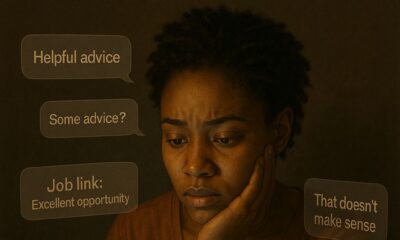Features
The Media and Marketing Vibe with Udochi: Should We All Be Creators?
Should everyone be a creator? The short answer is no, we shouldn’t all feel the need to be one. However, I understand the pressure to join in.

Should everyone be a creator? The short answer is no, we shouldn’t all feel the need to be one. However, I understand the pressure to join in. Everywhere you look, people are vlogging, posting carousels, repurposing ideas, and sharing insights. While you’re watching all of this, you might find yourself wondering if you’re falling behind.
The Thought of Relevance
The common thought is “If I don’t create, I’ll be invisible and irrelevant.” And social media makes it worse. The people getting jobs, gigs and influence don’t have two heads. You want to do something, anything, that proves you aren’t wasting your life.
But creating consistently isn’t natural. It’s a trained muscle that needs clarity, stamina, and the humility to keep going when no one claps. Most of us haven’t even figured out who we are, yet we’re told to be authentic online and hope someone validates our worth.
Before you try to be seen, ask yourself: “If someone does see me, what will they meet?” Build depth. Sharpen your clarity. Some of the most powerful people online don’t post daily. But when they do, people listen. That’s the level to aim for.
The Thought of Virality
Another thought is “But I want to blow. I want to go viral.” Of course you do. So do I. You see people with less insight and nuance get all the attention. It can be frustrating. Maybe you think you’re the problem because you aren’t loud enough, aesthetic enough, or not lucky enough. You post. You delete. You repost. You over-analyse
Thing is, virality sometimes rewards timing, emotion, formatting and familiarity, not necessarily depth. It’s less about what you’re saying, more about how easily the average scroll can consume it. You’re sweating over your most nuanced insight. Meanwhile, someone else is blowing up with “10 ways to wake up like Steve Jobs.” It’s the game. And the game is not always fair.
Meanwhile, viral moments rarely translate to long-term relevance. You can hit 1M views today and be forgotten by Friday. It’s why some creators go viral once, then disappear. No system. No strategy. Just boom, then silence. Meanwhile, people with frameworks, stories and real tools are building slowly. Quietly. But they’re owning their lane.
Stop chasing virality. There’s a difference between content that pops and content that plants. One gets a reaction. The other gets remembered.
Check these: Did someone message you and say, “This helped me in a real way”? Did it spark a conversation offline? Did someone screenshot it and save it, not just like it? That’s the win.
The Thought of Consistency
You’ve started posting, but now you wake up thinking, “What do I post next?” Your content is shaped by what you think people want to hear.
Yes, the algorithm rewards consistency, but not mindless output. The pressure to post daily has turned sharp thinkers into content factories. Because you haven’t had time to think deeply in weeks. Unconscious consistency turns you into a content zombie.
Think in systems, not posts. Builders don’t freestyle every day; they lay foundations. Create evergreen pieces. Posts that last. Turn repeated thoughts into frameworks. Batch when you’re clear. Rest when you’re not.
The Thought of Balance
Because you’re human and ambitious, you’re creating while job hunting, while rationing electricity, while worrying about rent, your family, and your mental health. You want to grow, but you’re also trying to survive.
Meanwhile, the creator economy was designed for people who already had a margin: time, therapy, electricity, Wi-Fi that works, infrastructure, money, mental health support, and safety nets. In Nigeria, where food, power, and peace of mind are luxuries, “finding your niche” sounds like a bad joke, and the pressure to “just show up online” can feel like a slap when you’re barely holding it together offline.
This game rewards loudness and aesthetics, but doesn’t understand the reality and context you’re living in. It’s like telling everyone to be an entrepreneur without fixing the system that punishes failure.
You need first to release the shame. You don’t owe the internet a single post or visibility if it costs your sanity. What you owe yourself is depth, honesty and peace.
But if you do want to show up, do it your way: Post once a week. Write when it’s honest, not when it’s trending. Build slowly, strategically. Prioritise your peace. You are not your engagement rate. If all you did this week was take care of your body, your mind, and your people, you’ve already won more than any algorithm can award.
The Thought of Monetisation
If I got a dollar every time I heard “Content is the new oil.” “Just start posting and watch the money roll in.” I would have bought 2 yachts by now. But no one tells you the money comes from what content attracts: clients, products, collaborations, job opportunities, credibility and others. Monetisation depends on your value stack.
Content is not a product. It works only when it’s pointing people to something or somewhere (a service, a solution, a skill). Otherwise, you’re just another unpaid thought leader. Also, creators who make money treat it like work. They build funnels, they test offers, they learn sales, they fail publicly, and they iterate. You cannot romanticise it.
People may clap. Maybe even share, but it doesn’t feed you. And the work that once felt thrilling starts to feel empty; that’s how resentment creeps in. To avoid this, focus on value creation first, then visibility. Build skills and package them. Think of content as infrastructure.
You can ask: What can I help someone solve without pretending to be an expert? Is it useful enough that people would pay to skip the struggle? Can I package it? Service? Template? Call? product?
A designer shares process breakdowns and sells strategy sessions. A developer shares debugging tips, builds trust, and lands freelance gigs. A career coach writes story-based posts and sells clarity calls. A talented person shares their talents, skills, and personality.
The Thought of Personal Branding
Everywhere you look, recruiters are saying: “We want people with a personal brand.” “We need talent that communicates online.” So you start to panic. “Do I need to dance on TikTok to get hired now?”
Yes, visibility matters now, but not the type you’re thinking of. You just need to be Google-able. When a hiring manager or investor types your name, what shows up? A post? A thought? A point of view? Or silence?
Most Employers don’t need you to be famous. They need proof that you can think, communicate and adapt. Except that your role involves audience visibility, volume and numbers
Don’t overcomplicate it. Pick one platform. LinkedIn? Twitter? Medium? Stick to one first. Post once a month. Just one clear, helpful insight related to your work or field. Document your approach. How you solve problems, what you’ve learned, and what you believe. Make it searchable. Use your name. Use keywords.
Are you a product manager? Break down how you handled a failed feature launch. Are you a lawyer? Share your take on a trending legal case in simple English. Are you in HR? Talk about how you’ve built culture in toxic workplaces. One strong post beat 30 weak ones. And remember, people don’t remember frequency. They remember clarity and soundness
The Thought of Perfection
“Let me make it better” has landed many great content in drafts. The truth is that silence can feel safe, but over time, it becomes a trap. You watch others say the same thing you’ve been thinking, but you see people you’re smarter than leading conversations.
And inside, you’re screaming. Well, you didn’t.
The longer you hide your voice, the harder it becomes to use it. Not posting protects your ego, but it also blocks your growth and shrinks your courage.
Start small. Create safe exposure. Share a post in your private group chat before posting publicly. Post anonymously, if you need to, to get feedback and build confidence. Treat your early posts as drafts. Done is better than perfection.
So, should everyone be a creator? No. And anyone who tells you otherwise is selling something. We’ve glorified the creator role, as if everyone must build an audience. But not everyone wants a stage. Some people are builders, not broadcasters. Creating publicly should be a choice, not a compulsion. It’s not the only path to value. But it is a powerful one, if you know why you’re doing it.
Ask yourself: Am I doing this because I want to be seen, or because I have something to say? Can I handle being misunderstood, or will it break me? Is this building my long-term leverage, or just feeding my short-term ego?
Who should probably not create (yet):
- People still defining their identity through applause.
- People easily derailed by low engagement.
- People more interested in optics than outcomes.
Who should consider creating:
- People tired of being misrepresented or invisible.
- People who’ve built real frameworks from lived experience.
- People whose silence is starting to feel like they are living small.
And if the idea of visibility doesn’t bother you, you’re living in a kind of grace most of us can’t even imagine.
























